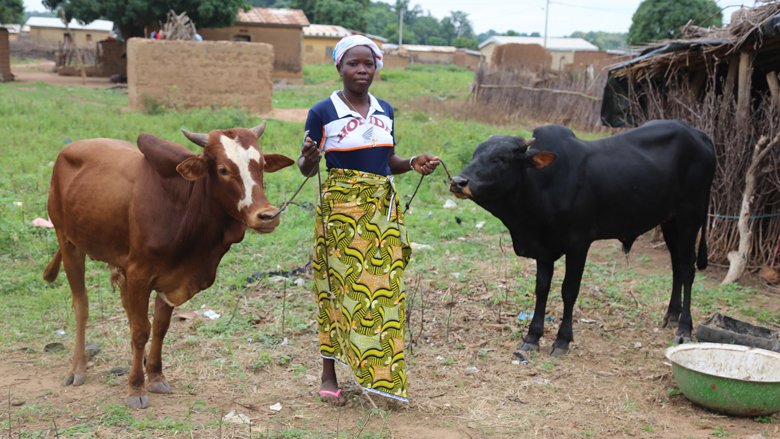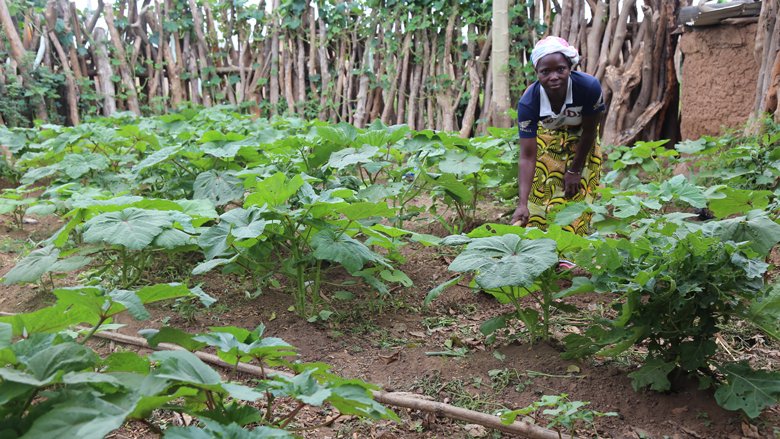Nambathiourkaha, July 7, 2022. In this village in the Korhogo region in the north of Côte d’Ivoire, Yéo Sali is proud to show off her two cows to her visitors. Reflecting the radical change in her life, she has grown from a modest small farmer just two years ago to become the owner of a sizeable herd of livestock. The turning point for this 47-year-old mother of four was the cash transfer that she received from the government. “Before, I used to farm only peanuts and I earned almost nothing from that. I couldn’t take care of myself or help my husband provide for our family,” she recalls. Sali was destitute and had never heard of the government project designed to help Ivorian nationals in her social category. “One day, some people came to our village to tell us about it. We were then taken to the Napié subprefecture to fill out various documents and were told that we would be receiving help from the government. I didn’t believe it at all, but they gave me a telephone and a SIM card, and I began to receive cash through mobile money,” she said.

In this village in the Korhogo region in the north of Côte d’Ivoire, Yéo Sali is proud to show off her two cows to her visitors.
@ World Bank | Enoh Gnahissan
STORY HIGHLIGHTS
- Cash transfers linked to the Productive Social Safety Net Project financed by the World Bank have enabled thousands of vulnerable households to develop economic activities and increase their income.
- Thanks to a cash transfer of CFAF 36,000 ($57.77), households in a village in the north of Côte d’Ivoire have formed an association and started to provide vital services for local ceremonies.
- In all, some 227,000 households have benefited from this social project, which gave them the resources they needed to get a start.
I am no longer poor; the support has helped me become independent. My husband respects me a lot more because he knows that he can count on me if he needs money.

@ World Bank | Enoh Gnahissan
Thanks to the cash transfer of CFAF 36,000 that she received each quarter for two years, Sali started to rear pigs, an income-generating activity. Pork is prized in the Poro region and demand is high. Sali’s investment has therefore proven to be a success. She also received training under the project to help her business thrive and is implementing the techniques learned to manage the family budget and engage in income-generating activities. Today, her herd has grown considerably and consists of 14 sheep, five pigs and two cows. She has also opened a hair salon for her daughter, who is completing her skills training.
The way she views her situation in life has changed: “I am no longer poor; the support has helped me become independent. My husband respects me a lot more because he knows that he can count on me if he needs money,” she says.
In Nambathiourkaha, 80 poor households have received similar cash transfers to enable them to develop a range of income-generating activities. Tuo Gbombali, the 80-year-old village chief, has seen the changes in his community: “The Social Safety Net Project has brought considerable change to our village. Today, households no longer engage in endless arguments. Project beneficiaries are even supportive of those who have not received cash transfers and we all live in harmony.” To ensure that the gains made are sustainable, beneficiary households have formed an association to carry out joint activities. The association used membership dues to purchase two tarps and 150 chairs that it then rents to villagers for use in various ceremonies. The association also contributes to social projects, such as the construction of the village kindergarten, by managing the financial contributions of villagers.
A foot in the door
The cash transfer that Sali received is part of the Productive Social Safety Net Project, financed by the World Bank in Côte d’Ivoire. By providing cash transfers to vulnerable households in selected regions, the objective of this initiative is, ultimately, to lay the foundations for a social safety net system. Approved in May 2015 in the amount of $50 million, the project has financed quarterly non-reimbursable payments of CFAF 36,000 over a period of three years (CFAF 144,000 or $231 per year) to 35,000 vulnerable households. In May 2019, the project was endowed with additional financing of $100 million to extend payment coverage to 227,000 households in urban and rural areas throughout all regions of Côte d’Ivoire.
In addition to providing cash transfers, the project also helps targeted households to access certain basic social services. “We sensitize beneficiaries about the objectives of the project, namely: education for children, health care for the sick, visits to health centers. With this in view, targeted households are given universal health coverage cards that allow them to access healthcare free of cost. We also train them in income-generating activities and help them set up village savings and loans associations,” explains Koné Nabaulsy Martine, community worker and project leader in the Korhogo region. Based on their end-June 2021 report, the cash balance of the Nambathiourkaha village savings and loan association totaled CFAF 800,000.
Mr. N’Dri Yao Claude, Poro regional director for social protection, notes that 16,835 persons have benefited from social safety nets, thereby strengthening the economic potential of many poor households in the north of the country. “Thanks to the cash transfers, many beneficiaries have been able to enlarge their fields and others have taken up livestock rearing, with impressive results. The reports that we get each day from households, particularly from women, are quite instructive.”
In addition to enabling them to improve their standard of living, the difference that this project has made to Sali’s life and to the lives of quite a few other beneficiaries has changed their perspective, by demonstrating that poverty is not inevitable.
